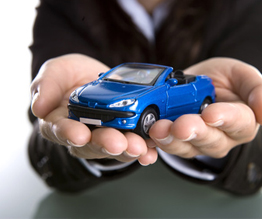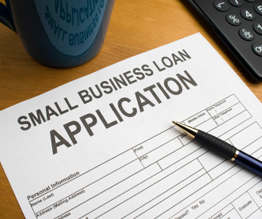A loan is the act of giving money, property or other material goods to another party in exchange for future repayment of the principal amount along with interest or other finance charges. A loan may be for a specific, one-time amount or can be available as an open-ended line of credit up to a specified limit or ceiling amount.

Home Loan is offered to individuals who wish to purchase or construct a house. The property is mortgaged to the lender as a security till the repayment of the loan. The bank or financial institution will hold the title or deed to the property till the loan has been paid back with the interest due for it.
Home Loan is offered to individuals who wish to purchase or construct a house. The property is mortgaged to the lender as a security till the repayment of the loan. The bank or financial institution will hold the title or deed to the property till the loan has been paid back with the interest due for it.
Types of Home Loan
- Home Purchase Loan
- Home Improvement Loan
- Home Extension Loan
- Home Conversion Loan

Well, an auto loan is basically a loan that you take out in order to purchase a vehicle. With an auto loan, you are not paying on the depreciation of the vehicle like you do with a lease. You are paying on the vehicle purchase price plus interest.
Auto Loan
Well, an auto loan is basically a loan that you take out in order to purchase a vehicle. With an auto loan, you are not paying on the depreciation of the vehicle like you do with a lease. You are paying on the vehicle purchase price plus interest.
Knowing this, are you still trying to decide if buying a car is right for you? Here are some factors that may help you make your decision.
Buying a vehicle may be right for you if:
- You have the money to make a significant down payment (20% or more)
- You would like to be able to trade in your vehicle
- You want to establish partial equity
- You prefer to own your vehicle
- You like to travel and don't want to have to worry about mileage restrictions
- You are tough on your vehicles and don't want to worry about wear and tear charges
- You don't need to switch cars every two or three years

Consumer loan granted for personal (medical), family (education, vacation), or household (extension, repairs, purchase of air conditioner, computer, refrigerator, etc.) use, as opposed to business or commercial use. Such loans are either unsecured, or secured by the asset purchased or by a co-signor (guarantor).
Personal Loan
Consumer loan granted for personal (medical), family (education, vacation), or household (extension, repairs, purchase of air conditioner, computer, refrigerator, etc.) use, as opposed to business or commercial use. Such loans are either unsecured, or secured by the asset purchased or by a co-signor (guarantor). Unsecured loans (called signature loans) are advanced on the basis of the borrower's credit-history and ability to repay the loan from personal income. Repayment is usually through fixed amount installments over a fixed term. Also called consumer loan.
You can get these loans at almost any bank. The good news is that you can usually spend the money however you like. You might go on vacation, buy a jet ski or get a new television. Personal loans are often unsecured and fairly easy to get if you have average credit history. The downside is that they are usually for small amounts, typically not going over $5,000, and the interest rates are higher than secured loans.
Personal loans are unsecured.
That means the loan doesn't require you to use an asset as collateral. If you default on a personal loan, the lender can't automatically take a piece of your property as payment for the loan. This is one of the reasons personal loans are more difficult to get. The lender doesn't have any asset to seize if you can't make loan payments anymore. Even though the lender can't automatically take your house or car, it can take other collection actions. This includes reporting late payments to the credit bureaus, hiring a collection agency, and filing a lawsuit against you.
Personal loans usually have fixed interest rates.
The interest rate is locked and doesn't change for the life of the loan. Like the loan amount, interest rates on personal loans are based on credit rating. The better your credit score, the lower your interest rate. Lower interest rates are ideal because it means you pay a lower cost for borrowing the loan. Some personal loans come with a variable interest rate that changes periodically. The drawback of a variable interest rate is that your payments can fluctuate as your rate changes making it harder to budget for your loan payments

In order to understand how a business loan works, imagine borrowing a capital to fund a startup or pay for an existing business's expansion without pledging anything against the borrowed amount.
Business Loan
In order to understand how a business loan works, imagine borrowing a capital to fund a startup or pay for an existing business's expansion without pledging anything against the borrowed amount. A Business Loan is thus an unsecured loan at an interest rate, giving you access to credit that can be paid back over an agreed time along with the interest, without any security against it.
Types
Businesses have a variety of loan options to choose from. Traditional bank loans are the most popular source of funding, however securing a loan from a bank is no easy task. According to a March 2010 article in Entrepreneur.com by Karin Price Mueller, banks are tightening their lending policies due to the economic downfall, making it more challenging for businesses to receive financial assistance from commercial loans. Aside from commercial loan options, businesses can apply for home equity lines of credit if one or more of the company owners are homeowners.
Features
Loans are not given out for free. Lenders charge interest on loans as the price paid for borrowing the money. It is important to know whether the interest is fixed or variable. A fixed interest rate means that the interest rate remains the same for the duration of the loan and its payback period. A variable interest rate indicates that the interest rate can fluctuate based on a variety of determinants. Other features of a loan to pay attention to are the payback period (months or years) and what the lender will use as collateral if the business is unable to pay the loan back timely.

A loan against property (LAP) is exactly what the name implies -- a loan given or disbursed against the mortgage of property. The loan is given as a certain percentage of the property's market value, usually around 40 per cent to 60 per cent.
Loan Againt Property
A loan against property (LAP) is exactly what the name implies -- a loan given or disbursed against the mortgage of property. The loan is given as a certain percentage of the property's market value, usually around 40 per cent to 60 per cent.
Loan against property belongs to the secured loan category where the borrower gives a guarantee by using his property as security.
What purposes can I take a loan against property for?
Loan against Property can be taken for following purposes:
- Expanding your business
- Getting your son/daughter married
- Sending your son/daughter for higher studies abroad
- Funding your dream vacation
- Funding medical treatments

Cash credit is a type of short term loan provided to companies to fulfill their working capital requirement.
Working Capital Requirements
Many business organization needs funding for fulfilling their monetary requirement. The funding can either be short term or long term. Nowadays people choose a short term loan like cash credit and overdraft. "Cash Credit" is a type of facility provided by the bank or financial institution in which, a company can withdraw an amount more than what he holds to his credit against the security of stock. "Overdraft" is another facility, in which the bank permits the customer to debit his current account below zero but only up to a specified limit. After a complete research, a compilation of difference between cash credit and overdraft is made considering various criterion.
